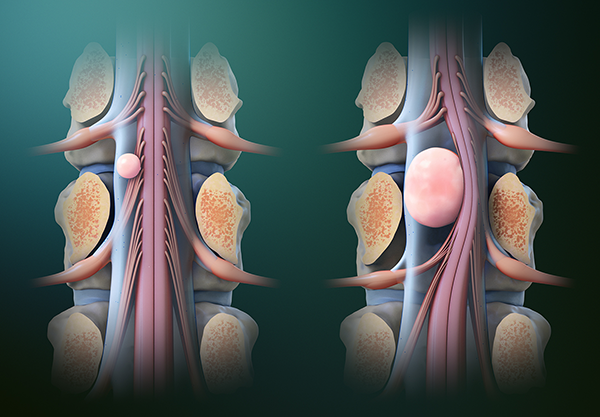
Spinal Tumor
A spinal tumor is a growth that develops within your spinal canal or within the bones of your spine. A spinal cord tumor, also called an intradural tumor, is a spinal tumor that that begins within the spinal cord or the covering of the spinal cord (dura). A tumor that affects the bones of the spine (vertebrae) is called a vertebral tumor .
The treatment for spinal tumors depends on the type of tumor, its location, and your overall health. Treatment options include surgery, radiation therapy, chemotherapy, targeted therapy, and immunotherapy .
What causes spinal tumors?
The cause of primary spinal tumors is unknown. Some primary spinal tumors occur with certain inherited gene mutations. Most extradural tumors are metastatic commonly from breast, prostate, lung, and kidney cancer. There are many genetic factors associated with intradural tumors, most commonly neurofibromatosis 1 (NF1), neurofibromatosis 2 (NF2), and Von-Hippel Lindau (VHL) syndrome .
What are the symptoms of spinal tumors?
Spinal cord tumors can cause different signs and symptoms, especially as tumors grow. The tumors may affect your spinal cord or the nerve roots, blood vessels or bones of your spine. Signs and symptoms may include:
- Pain at the site of the tumor due to tumor growth
- Back pain, often radiating to other parts of your body
- Feeling less sensitive to pain, heat and cold
- Loss of bowel or bladder function
- Difficulty walking, sometimes leading to falls
- Back pain that’s worse at night
- Loss of sensation in your legs or arms
- Muscle weakness in your legs or arms
- Muscle twitches or spasms
- Stiff back or neck .
The diagnosis of spinal tumors usually involves a combination of tests and procedures, including:
- Medical history and physical exam
- Imaging tests such as X-rays, CT scans, MRI scans and PET scans
- Biopsy .
The treatment for spinal tumors depends on several factors, including the type and location of the tumor, your overall health and your preferences. Treatment options may include:
- Surgery
- Radiation therapy
- Chemotherapy
- Stereotactic radiosurgery
- Observation







